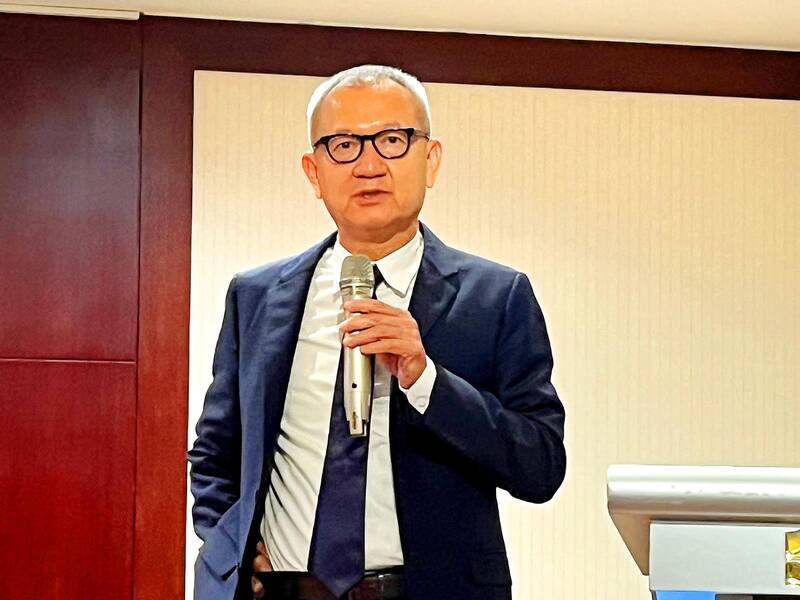Passive components maker Yageo Corp (國巨) yesterday said it expects the acquisition of two European sensor companies to add about NT$13 billion (US$403 million) to its revenue next year, helping the company broaden its product offerings to high-end sensors used in automotive and industrial devices.
The sensor market is a new area for Yageo, the company said.
The new acquisitions would also help the company better shield against industrial downturns and economic headwinds, as its premium products are less volatile than standard passive components used in consumer electronics.

Photo: Chang Hui-wen, Taipei Times
“The acquisitions will accelerate Yageo’s expansions into premium markets such as the automotive segment, allowing the company’s operation to better weather downturns,” Yageo chairman Pierre Chen (陳泰銘) told an investors’ conference in Taipei.
High-end products are to account for 80 percent of the company’s total revenue following the transactions, compared with 75 percent currently, Chen said.
Additionally, Yageo this year could hit its target of boosting automotive-related product revenue to 22 percent, one year earlier than expected, he said.
Chen made the remarks after the company last month unveiled plans to acquire German sensor supplier Heraeus Holding GmbH and France-based Schneider Electric’s Telemecanique sensor business for NT$2.84 billion and NT$12.4 billion respectively.
The firm has a good chance to complete the transactions in the first half of next year, he said.
With higher revenue from premium products, Yageo does not expect to experience the significant drop in gross margin seen by its peers, Chen said, adding that local competitors generated more than 90 percent from standard passive components, and saw gross margin dip to just above 10 percent from 30 percent.
“Companies with high exposure to standard products are going to experience a tough time during the next two years,” he said.
The passive component industry is entering into an inventory-driven downward trend, although excessive inventories in supply chains are expected to level off in the second or third quarter of next year, Chen said.
Yageo has been trying to enter the sensor market since 2015, he added.
The company now has grown into the world’s No. 3 maker of passive components through 20 mergers and acquisitions over the past two decades. Revenue expanded to NT$106.54 billion last year, surging 58 percent from 2020.
Yageo operates 42 factories in 28 countries. About 80 percent of its 45,000 employees are based abroad.

Sweeping policy changes under US Secretary of Health and Human Services Robert F. Kennedy Jr are having a chilling effect on vaccine makers as anti-vaccine rhetoric has turned into concrete changes in inoculation schedules and recommendations, investors and executives said. The administration of US President Donald Trump has in the past year upended vaccine recommendations, with the country last month ending its longstanding guidance that all children receive inoculations against flu, hepatitis A and other diseases. The unprecedented changes have led to diminished vaccine usage, hurt the investment case for some biotechs, and created a drag that would likely dent revenues and

Global semiconductor stocks advanced yesterday, as comments by Nvidia Corp chief executive officer Jensen Huang (黃仁勳) at Davos, Switzerland, helped reinforce investor enthusiasm for artificial intelligence (AI). Samsung Electronics Co gained as much as 5 percent to an all-time high, helping drive South Korea’s benchmark KOSPI above 5,000 for the first time. That came after the Philadelphia Semiconductor Index rose more than 3 percent to a fresh record on Wednesday, with a boost from Nvidia. The gains came amid broad risk-on trade after US President Donald Trump withdrew his threat of tariffs on some European nations over backing for Greenland. Huang further

Nvidia Corp’s GB300 platform is expected to account for 70 to 80 percent of global artificial intelligence (AI) server rack shipments this year, while adoption of its next-generation Vera Rubin 200 platform is to gradually gain momentum after the third quarter of the year, TrendForce Corp (集邦科技) said. Servers based on Nvidia’s GB300 chips entered mass production last quarter and they are expected to become the mainstay models for Taiwanese server manufacturers this year, Trendforce analyst Frank Kung (龔明德) said in an interview. This year is expected to be a breakout year for AI servers based on a variety of chips, as

HSBC Bank Taiwan Ltd (匯豐台灣商銀) and the Taiwan High Prosecutors Office recently signed a memorandum of understanding (MOU) to enhance cooperation on the suspicious transaction analysis mechanism. This landmark agreement makes HSBC the first foreign bank in Taiwan to establish such a partnership with the High Prosecutors Office, underscoring its commitment to active anti-fraud initiatives, financial inclusion, and the “Treating Customers Fairly” principle. Through this deep public-private collaboration, both parties aim to co-create a secure financial ecosystem via early warning detection and precise fraud prevention technologies. At the signing ceremony, HSBC Taiwan CEO and head of banking Adam Chen (陳志堅)